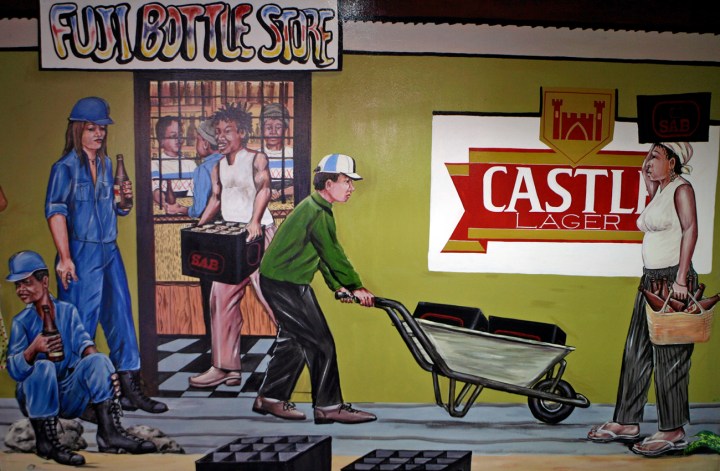Business Maverick, Politics
Analysis: A fair and balanced view of ANC’s march against alcohol

The ANC is on the march again, this time against booze. Gauteng’s economic development MEC Qedani Mahlangu is determined to stop bottle stores from being open on Sundays, while the national government is moving towards banning alcohol advertising. Both tell us something about the ANC. They also tell us South Africa, after a long liberal swing, is beginning to move in a more conservative direction on social issues. We're not surprised. By STEPHEN GROOTES.
There are some among us, myself included, who’ve been caught a little short while on coastal holidays. “What do you mean the bottle store is closed?” we’ve muttered to amused relatives, “it’s only 10 in the morning”. But it’s been a Sunday and thus we’ve been forced to wait what felt like an awfully long time before having another snifter. Unless another source could be found, of course. (In a small town in Eastern Cape one enterprising store has an “emergency telephone number” outside, which wakes the owner inside). It’s a mark of how out of sync Gauteng can be with the rest of the country. (And of how we are incapable of planning just a day ahead.)
Mahlangu says that is all going to change. And she says she’s not worried about what kind of opposition she’ll get, she’s going to do it anyway. She’s not being undemocratic there, she just knows that most people are going to go along with her. And she’s right. Think about the average decision-making ANC member. They may be a parent, they will certainly have seen at some point in their lives the damage alcohol can do. At the other end of the scale, publicly at least, Julius Malema and his ANC Youth League claim to be against the evil firewater. They campaign against alcohol abuse. (Of course, that doesn’t apply to them, perish the thought.) Meanwhile, Mahlangu’s boss, Gauteng Premier Nomvula Mokonyane has made it clear that the licensing conditions must be made tougher. The DA in the province is probably going to go along with them. Why not? It’s a good social issue, and of course, it wouldn’t do to contradict in opposition in Gauteng what you do in Western Cape in government.
But there are a few more issues in play here. The first is that we all know alcohol abuse is a serious problem. And we also know prohibition doesn’t work, that’s thankfully off the table. But tightening up licensing conditions is not a bad idea. Just drive down Louis Botha any night of the week and look at the people on the side of the road. There are several bottle stores that stay open until 20:00. Someone who started drinking at noon and ended at five looks very different to someone who started at 10:00 and is still going at eight. You can spot them easily. And the fact this happens seven days a week means there are some people who never suffer the inconvenience of a hangover. But their remaining life expectancy can be measured in months. With Sunday trading, parties that start late on Saturday can continue all the way through Sunday. Without Sunday trading, that is more difficult.
Of course there is a pretty strong argument against this as well. And it’s well put by the Industry Association for Responsible Drinking’s Adrian Botha. Basically, if you close the legal places on Sunday’s, you push people to the illegal ones. That is true, prohibition doesn’t work. But perhaps there’s merit in reducing the number of places to buy alcohol.
Incidentally, isn’t the idea of an “Industry Association for Responsible Drinking” awfully clever? Try getting the big booze company (the missing “s” is deliberate) to talk about this… it’s not that easy. The main reason is that you now have a smooth PR guy who will happily talk forever about drinking, and what the industry is trying to do to stop it, and at the same time make all the arguments against tighter regulation.
This trend in Gauteng is also being felt nationally. In theory, banning booze ads is attractive to policy makers. But there’s a big presumption that advertising is why people drink. It’s not. It may make the idea seem more attractive, however. It’s not like the people in alcohol ads are ugly. Just like you never saw anyone in a cigarette advert cough.
But the experience in countries that have banned booze shows that people don’t stop drinking. And there is a huge cost to banning advertising. One study by marketing analyst Chris Moerdyk found the media industry would lose nearly R2 billion a year if the ban goes through. And the losses don’t stop there, because presumably a ban would lead to jobs going in related sectors.
A loss of this advertising would severely hurt the media. Just when government, or really the ANC, is stepping up its campaign against the media. Hmmm. Curiouser and curiouser, as Alice would say. There is a chance someone somewhere has realised this would really weaken the independent media through the back door. And while the SABC would be hugely affected as well, that might be a small price to pay for severely weakened independent media outfits.
But having said that we must be fair. Banning booze ads is a natural evolution from banning tobacco ads. And it’s been somewhere on the political agenda for a long time.
We’ve suggested before that democratic societies like ours tend to swing back and forth on issues. There will be some movement, then a swing back. It’s natural. Once perfect equilibrium is found, the swinging stops. We certainly haven’t found that happy place with alcohol, perhaps we will in some yet-to-be-defined future. These moves are small nudges in a direction towards that place. Whether they work or not will be seen by which direction we move next. DM
Grootes is an EWN reporter.
Photo: A painting by Lunguphi is seen at the entrance of the South African Brewery in Alrode, Johannesburg, April 2,2009. REUTERS/Siphiwe Sibeko


















 Become an Insider
Become an Insider